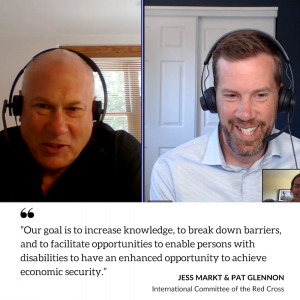At first glance, a Lemon Tree Hotel appears similar to lots of other hotels. Smiling staff, contemporary décor and comfortable facilities. But step inside and you soon realise that this is no ordinary hotel. Lemon Tree has been hiring people with a wide variety of disabilities and building a truly inclusive workplace since 2007, and the results are impressive.
The company started by hiring a few deaf employees. Today, the hotel chain employs people across all marginalised segments of Indian society, including people with intellectual or physical disabilities, transgender, widows ostracised by their communities, and survivors of acid attacks. In fact, 20% of the company’s employees come from marginalised groups.
With 84 hotels in 52 cities, Lemon Tree Hotels is a successful hotel chain that caters to both business and leisure travellers. And according to Aradhana Lal, Vice President of Brand, Communications & Sustainability Initiatives, this success is partly due to its diverse workforce. When the company first started pushing for inclusivity, it was a pilot scheme that took everyone by surprise. But now, having seen the benefits of employing disabled people, inclusivity is an integral part of the company’s culture.
Lemon Tree embodies the real meaning of inclusion, with disabled employees in all hotels and across all departments – from front office and food and beverage to the engineering and finance departments.

Disability and Employment in India
According to the most recent census in India, conducted in 2011, approximately 2.2% of the population identifies as disabled, although the true number is likely much higher. And recruitment platform Equiv.in reports that the unemployment rate among disabled people is over 70%. As Aradhana explains, there is a stigma associated with disability in India. For example, those with intellectual disability are kept out of school, making it difficult for them to find employment or achieve financial independence.
That’s why Lemon Tree’s approach is so important. By actively embracing inclusivity, the company is creating essential employment opportunities for disabled people and setting an example for other organisations in India – and around the world – to follow.

A Lemon Tree employee, who survived an acid attack
Inclusivity as a Business Model
Inclusivity at Lemon Tree is not about being charitable, it’s a business model bringing benefits for the company, as well as employees, customers and the nation. As Aradhana explains, by hiring people with disability, the company has widened its talent pool. “In India, hotels are after the same set of potential employees. Often, this makes it difficult to acquire enough talent. But if you consider people with disability in your talent pool, then you are more likely to source talent as per the company’s recruitment needs.”
She says the company has also found that people with special needs can be more creative. They’ve had to negotiate life and overcome hurdles, so they tend to be more solution-oriented than other people. And if people with disability use these skills in the workplace, they might observe patterns and customer needs that people without disability cannot see. For example, deaf employees have highly attuned observational skills. They notice small movements, so in a busy cafe setting, they may be more attentive to customers’ needs.
The hotel chain has also had positive feedback from customers. Aradhana says, “Many customers have told us they like being served by our employees with disability because they’ve been more attentive. They’re also motivated and engaged.” To top it off, the company has discovered that team members without disability learn from employees with disability – they give them a new frame of reference. And when Lemon Tree surveyed its staff, one of the top reasons they gave for work satisfaction was the inclusivity aspect. The organisation is now enjoying a high retention rate, both in terms of staff and customers.
It’s not all about profit, though. By employing people with disability, Lemon Tree is representing real life. As Aradhana says, “Giving people with disability job opportunities, and helping them live independently and with dignity, is important for society as a whole.”

Lemon Tree employees, with Downs Syndrome
The Seven Pillar Model: Creating an Inclusive Workplace
To successfully achieve its inclusivity goals, Lemon Tree developed a model based on what it calls the Seven Pillars:
- Leadership – the vision must first come from the top, whether that’s the CEO or the Managing Director
- Dedicated inclusivity resource – at the Lemon Tree, that person is Aradhana, who spends a substantial amount of her time focused on the inclusion programme and its expansion
- Sensitisation – to ensure that everyone understands why the company is doing this. Plus, companies also need to plan for which disabilities they will work with next and how. As Aradhana explains, sensitisation should be an ongoing programme with regular check-ins
- Job Mapping – every entry level role in the company, and the tasks associated with each role, are mapped. Employees with disability may not be able to do every task, so it’s important to revise the standard operating procedure or to remove a couple of tasks from that person’s role. Aradhana says that job mapping is key, as it gives employees with disability the opportunity to succeed
- Partnerships – Lemon Tree works with specialist NGOs to provide support and insights, including helping to run traineeships for new employees with disability
- Training – is modified to give trainees the best chance of success. For example, people with intellectual disabilities are given the opportunity to learn at a slower pace. This is particularly important in India, where people with disability may not have been exposed to the world of work or education. If successful, the company will offer the employees a job following the training
- Scaling up and going national – to benefit society as a whole, it’s essential to move away from micro changes and implement these strategies on a wider scale. Fortunately, other companies have approached Lemon Tree for advice, and Aradhana has watched some successfully implement inclusion strategies.
There’s still a long way to go in terms of disability employment and inclusion – both in India and on a global scale. But Lemon Tree’s work offers an incredible example for companies everywhere of why it makes sense and how to do it as this short video shows. As Aradhana says, “I feel very happy and proud of our inclusive company. It goes beyond money – there’s a sense of engagement that’s very powerful,” and seeing Lemon Tree Hotels great work is brought to life in this we can see exactly why.
___




















